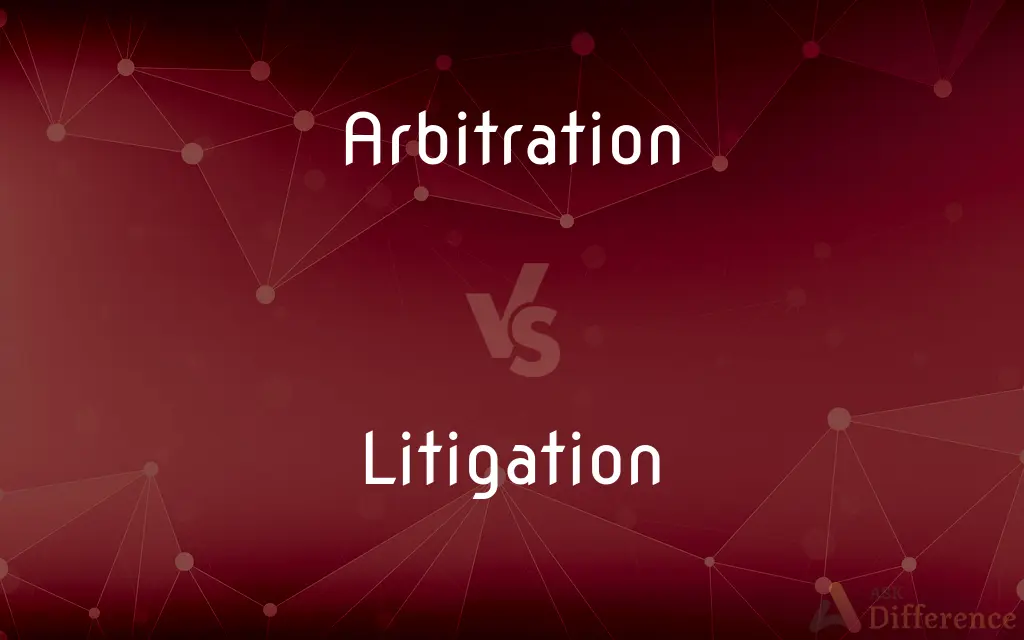Arbitration vs. Litigation — What's the Difference?
By Tayyaba Rehman — Updated on September 15, 2023
Arbitration is a private dispute resolution process outside courts, where parties agree on a neutral third party to decide. Litigation is a formal process where disputes are resolved in courts before a judge.

Difference Between Arbitration and Litigation
Table of Contents
ADVERTISEMENT
Key Differences
Arbitration is an alternative dispute resolution method where conflicting parties voluntarily agree to let a neutral third-party, often an expert in the subject matter, resolve their dispute. It's private, usually quicker, and tends to be more flexible than court procedures. Litigation, meanwhile, involves taking a dispute to court where a judge or jury makes the final decision. This method is more formal, often public, and follows strict procedural rules.
In the realm of arbitration, the disputing parties typically have more control over the process. They can decide on the arbitrator, set some procedural ground rules, and often choose the applicable laws or rules governing the dispute. On the other hand, in litigation, parties have less influence over proceedings. They're bound by court schedules, rules of evidence, and the decisions of a judge or jury.
The finality of decisions varies between arbitration and litigation. Arbitration decisions, known as awards, are typically final and binding, with limited grounds for appeal. Litigation, however, offers more avenues for appeal, allowing parties to challenge a decision through higher courts.
Costs and time frames differ significantly. Arbitration can be quicker and less expensive, although high-stakes or complex arbitrations can become costly. Litigation is notoriously time-consuming and can be more expensive, given court fees and associated costs.
Comparison Chart
Definition
Private dispute resolution by a neutral party.
Formal court process to resolve disputes.
ADVERTISEMENT
Decision Maker
Arbitrator(s).
Judge or jury.
Flexibility
More control over proceedings.
Strict procedural rules.
Appeal Options
Limited.
Multiple levels of appeal possible.
Costs & Duration
Generally quicker and less expensive.
Can be lengthy and costly.
Compare with Definitions
Arbitration
Voluntary process agreed upon by conflicting parties.
Both parties signed an agreement to settle through arbitration.
Litigation
Offers avenues for appeal to higher courts.
Unhappy with the decision, they pursued further litigation in the appellate court.
Arbitration
Private resolution of disputes by neutral third parties.
The company prefers arbitration to resolve employee disputes.
Litigation
Public proceedings following strict procedural rules.
During litigation, all evidentiary rules must be followed.
Arbitration
A flexible method allowing parties to set certain rules.
The parties chose their arbitrator and location for arbitration.
Litigation
Formal process to resolve disputes in court.
The company is no stranger to lengthy litigation.
Arbitration
Binding decisions with limited appeal avenues.
The arbitration award was final, leaving no room for appeal.
Litigation
A method involving judges and sometimes juries.
The litigation went to trial, with a jury deciding the outcome.
Arbitration
An alternative to traditional court proceedings.
Considering the costs, they opted for arbitration instead of court.
Litigation
Can involve any legal dispute, civil or criminal.
The litigation over the contract dispute lasted two years.
Arbitration
Arbitration, a form of alternative dispute resolution (ADR), is a way to resolve disputes outside the judiciary courts. The dispute will be decided by one or more persons (the 'arbitrators', 'arbiters' or 'arbitral tribunal'), which renders the 'arbitration award'.
Litigation
To prosecute or defend (a lawsuit or legal action); pursue (a legal case).
Arbitration
The use of an arbitrator to settle a dispute
Tayside Regional Council called for arbitration to settle the dispute
Binding arbitration
Litigation
To bring a lawsuit or defend against a lawsuit in court.
Arbitration
The process by which the parties to a dispute submit their differences to the judgment of an impartial person or group appointed by mutual consent or statutory provision.
Litigation
(legal) The conduct of a lawsuit.
There is ongoing litigation in this matter.
This law firm is known for its litigation practice.
That attorney has been chastised for his litigation behavior.
Arbitration
The act or process of arbitrating.
Litigation
The act or process of litigating; a suit at law; a judicial contest.
Arbitration
A process through which two or more parties use an arbitrator or arbiter in order to resolve a dispute.
Litigation
A legal proceeding in a court; a judicial contest to determine and enforce legal rights
Arbitration
In general, a form of justice where both parties designate a person whose ruling they will accept formally. More specifically in Market Anarchist (market anarchy) theory, arbitration designates the process by which two agencies pre-negotiate a set of common rules in anticipation of cases where a customer from each agency is involved in a dispute.
Arbitration
The hearing and determination of a cause between parties in controversy, by a person or persons chosen by the parties.
Arbitration
(law) the hearing and determination of a dispute by an impartial referee agreed to by both parties (often used to settle disputes between labor and management)
Arbitration
The act of deciding as an arbiter; giving authoritative judgment;
They submitted their disagreement to arbitration
Common Curiosities
Is arbitration a type of litigation?
No, arbitration is an alternative to litigation, offering a different method of dispute resolution.
Who chooses the arbitrator?
Typically, the parties involved in the dispute mutually select the arbitrator.
What types of cases are suitable for litigation?
Any legal dispute, civil or criminal, can be subject to litigation.
Can you appeal an arbitration decision?
Generally, arbitration decisions are final with limited grounds for appeal.
Is litigation always public?
Most litigation is public, but certain matters may be sealed or held privately.
Can arbitrators give any type of award?
Arbitrators' powers are defined by the agreement but they must adhere to agreed terms.
How is the venue chosen for arbitration?
Parties usually agree on a venue in their arbitration agreement.
How long does litigation usually last?
Litigation duration varies but can be lengthy, especially with appeals.
Are arbitration decisions legally binding?
Yes, most arbitration decisions are binding, similar to court judgments.
Can I opt for arbitration after starting litigation?
Yes, parties can agree to arbitration even after litigation has begun.
Who pays for the costs in litigation?
Typically, each party pays their own costs, but a judge might order the losing party to pay both sides.
Is arbitration always cheaper than litigation?
Not always; while arbitration can be more cost-effective, complex cases can be expensive.
Can a litigation case be dismissed before trial?
Yes, litigation can be dismissed for various reasons before reaching trial.
Are all civil disputes subject to litigation?
While most civil disputes can be litigated, some may be mandated for arbitration or mediation first.
Is arbitration confidential?
Yes, arbitration is usually confidential, unlike public court proceedings.
Share Your Discovery

Previous Comparison
Traitorous vs. Treasonous
Next Comparison
Fertilization vs. GerminationAuthor Spotlight
Written by
Tayyaba RehmanTayyaba Rehman is a distinguished writer, currently serving as a primary contributor to askdifference.com. As a researcher in semantics and etymology, Tayyaba's passion for the complexity of languages and their distinctions has found a perfect home on the platform. Tayyaba delves into the intricacies of language, distinguishing between commonly confused words and phrases, thereby providing clarity for readers worldwide.















































